12
December
We’ve all asked this question to ourselves at some point in our lives. When deciding whether to rent or purchase a home, we need to ask ourselves the following 5 questions.
- Where will I be living the next 3-5 years?
A timeframe matters. Where will you be living in the next 3, 5, 7, 10+ years? The reason why this is so crucial in deciding to rent or buy is because there comes a point in time where it becomes more economical to rent vs. buy or buy vs. rent. Here is a Rent vs. Buy calculator that you can use to decide what the breakeven point (in years) is for you in your current situation based on your budgeted rent amount: http://www.zillow.com/rent-vs-buy-calculator/
- Which is right for me & my situation?
You’ll need to ask yourself some very important questions before making that decision. What are my goals for me and/or my family? What does my situation allow, financially, emotionally, physically, etc? Where will I be living in the upcoming years? Do I want to handle maintenance and upkeep? How can I best invest in my financial future?
- What are the pros & cons of buying?
There are also several pluses and minuses with buying.
- PROS:
- You can write off your mortgage interest as a tax deduction.
- You build equity. Utah’s real estate is currently appreciating at approximately 5-7% per year. That could be tens of thousands a year.
- You can make it your own. It’s all yours. No one has a legal claim on that property other than the bank.
- You build pride of ownership.
CONS:
- You have to maintain it. If the water heater breaks, it’s your responsibility to fix it.
- You can’t move around as much. You can always rent out your home, but there are lending rules regarding selling or moving too early.
- It’s a big commitment. If you don’t make the payments, the bank can foreclose.
- What are the pros & cons of renting?
There are drawbacks and incentives to renting.
- PROS:
- It’s more short term. Renting gives you more flexibility to leave the property and move pretty much whenever you want.
- Your landlord has to pay for maintenance, repairs, upgrades, etc. You live with peace of mind.
- CONS:
- It’s typically more expensive than a house payment.
- You can’t write off your rent as a tax deduction.
- You aren’t building equity for your financial future.
- You can’t fully decorate your home the way you want it.
- What are the costs associated with each?
To make a more informed decision, it’s important to have a full understanding of what expenses come into play with each.
- Renting: Typically rents are higher than mortgages. Obviously as a tenant, your landlord covers maintenance and repair costs for you. When renting, you’ll need to fork out a security deposit, which may or may not be fully refundable upon move out.
- Buying: When buying a home, you’ll most likely need a downpayment, however, there are loan programs available that do not require ones as well. With buying, closing costs (which can be financed or paid in cash and are typically around 2.5 to 3% of the loan amount), will be a cost associated with buying. Where does that money go? Towards prorated homeowners insurance for the year, taxes, prepaid mortgage payments (typically one or two), insurance, etc. Owning a home has other costs as well–repairs, maintenance, renovations, etc.
Asking these 5 questions will allow you to make a more informed decision for you and your family.
